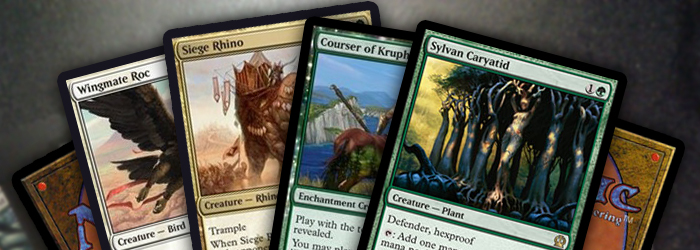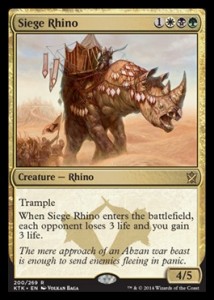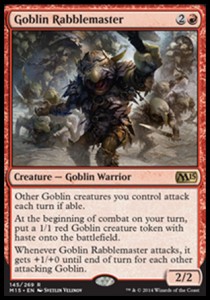
By Logan White
So this is what it’s like playing a real deck? –Logan
Transforming one’s mindset can be difficult. I love making my own decks, and I’ve always had that shared dream of deck brewers: to see your own creations make their way to the top—to post a solid result in a major tournament with a deck of your own creation. I’ve also had the dream of many Magic players: to perform well enough in major events to become a professional player. I’ve learned over the course of my years playing Magic that while this is not mutually exclusive, it’s extremely difficult to accomplish both simultaneously. A few weekends ago, I accepted that I had to change; I decided that I was no longer content with being “just a brewer” and that I wanted to move up in the world of Magic.
I was no longer content with being a second-rate Magic player. The best I had ever done was a top 32 at a Diamond Event nearly three years ago, and I wasn’t getting anywhere. I was tired of losing, tired of dropping from grands prix in the fourth or fifth round after accruing early losses to top-tier decks. I knew I had to change; I had seen the writing on the wall for the longest time. Either I had to be content with being a deck creator and not getting anywhere, or I had to expand my mental horizons. I opted for the latter—I opted to change.
How So?
I knew I wanted to play a good deck for the TCGplayer Max Point Championship and I knew that I was only making so much progress with my brew at the time (GW Chord). This story starts a little over two weeks before the Max Point Championship, when I was still considering things. My Chord deck just kept losing matches I expected to win. It lacked the power of some of the best cards in the format because I didn’t want to play anything that could be remotely connected to a “net deck.” I refused to consider the options of looking at those decks. The pro tour had just concluded, and Abzan had come out ahead over the Jeskai deck. The decks looked sweet, I liked a lot of the different options that they included, but I still wasn’t planning on playing anything remotely like them. I was being stubborn.
I had been discussing with my friend and fellow Magic player, Jon Bohn, what I was planning on doing for the Max Point Championship, and I recall the following conversation:
Me: “Is it worth putting black in my GW Chord deck for Siege Rhino and an Abzan Charm or two, right?”
Jon: “… Just play Abzan without the clunky Chords”
Me: “But Chord is great?”
Jon: “No, it’s really not. Just play a real deck”
Usually, I would have just ignored those words, as I had many a time before, but this time it just hit me. The reason I wasn’t actually living up to my potential as a Magic player: I wasn’t playing a real deck. I hadn’t wanted to relinquish my creative side as a player, and because of that, I had never played a “real deck.” If I wanted to actually win, I needed to make my deck be a deck archetype that was fully tuned. I only had a week and a half before I would be heading to Indiana for the tournament, and I had to not time to keep messing around with my Chord build. I needed to play Abzan. It was “the best” deck in the format, after all.
At this point, I started looking at the top eight Pro Tour Khans of Tarkir decks, considering their benefits and flaws, with a specific focus on the Abzan lists. I found numerous versions of the deck in the top eight, and even more in the top 32. After reviewing all of the possibilities, I decided that I liked Thiago Saporito’s deck list from the top, but I also liked different pieces that were present in Ari Lax’s first-place list. I took the time to compare the lists before committing to anything specific and noticed the key trend between all of the lists I had reviewed—the crux of the deck. All of the decks included at least 16 creatures, in the form of a playset of Caryatids, a playset of [card]Courser of Kruphix[/card], a playset of [card]Siege Rhino[/card], and a mix of [card]Elvish Mystic[/card]s and [card]Wingmate Roc[/card]s. The also included at least two Sorins, three [card]Abzan Charm[/card]s, three [card]Hero’s Downfall[/card]s, two Elspeths (in the full 75), and four [card]Thoughtseize[/card]s (in the full 75).
I decided that I could still use my creativity that I had developed as a deck brewer and tweak these deck lists to come up with my own winning combination of Abzan. For all intents and purposes, it was both a brew and a net deck. It was the perfect median for me. I had to test the deck style to find my proper configuration, so I turned to the only real resource I could trust to get some representation of the metagame: Magic Online.
That’s Some Serious Commitment Right There
I dropped the necessary cash, sold one of my two stockpiled VMA Lotuses, and got the deck I wanted to try together. I immediately entered an eight-man and won it. Surprised at how efficient the deck was, I tried for a repeat, but lost in my second match to Mono-Red Aggro. I booted up the next eight-man, promptly went up against Mono-Red, again and lost.
“Well, that was unpleasant. I hate that stupid deck,” I remember stating. I made some more tweaks and played another eight-man. I lost in the finals, but still netted some packs. I was actually enjoying myself playing Standard. It was a new concept for me, since I hadn’t enjoyed playing Standard during the entirety of Theros block.
For the next week and a half, I continued to grind eight-mans and even a Daily Event or two when my schedule synced up with them. I got more proficient with the deck, and began to continue to tweak it. I finally arrived at the following 75:
[Deck Title=Abzan by Logan White]
[Creatures]
4 Sylvan Caryatid
4 Rakshasa Deathdealer
4 Courser of Kruphix
4 Siege Rhino
3 Wingmate Roc
[/Creatures]
[Planeswalkers]
3 Sorin, Solemn Visitor
1 Ajani, Mentor of Heroes
2 Elspeth, Sun’s Champion
[/Planeswalkers]
[Spells]
4 Abzan Charm
3 Hero’s Downfall
1 Drown in Sorrow
2 Thoughtseize
[/Spells]
[Lands]
4 Sandsteppe Citadel
3 Temple of Malady
2 Temple of Silence
1 Temple of Plenty
4 Llanowar Wastes
1 Caves of Koilos
3 Windswept Heath
1 Urborg, Tomb of Yawgmoth
4 Forest
1 Plains
1 Swamp
[/Lands]
[Sideboard]
1 Erase
2 Thoughtseize
3 Bile Blight
2 Drown in Sorrow
1 Whip of Erebos
2 End Hostilities
1 Liliana Vess
2 Duneblast
1 Garruk, Apex Predator
[/Sideboard]
[/deck]
I sleeved it up and took it to the tournament. I was a mix of confidence and nerves, lost somewhere between anticipation and fear. It was going to be the first time I was playing a “real deck” in a major tournament. If it didn’t pan out, would I keep playing real decks? I had attained a round-one bye and took the time to find some breakfast and get myself mentally prepared for the upcoming tournament. I knew I had prepared for this event, but I was still uncertain as to my chances. After clearing my head, I went and sat down for my first actual match. My opponent was on a black-white brew, a controlling build. I took me three games, but I was able to out pressure him, winning my first match.
I experienced a rush of euphoria as I saw my first opponent fall to the power of a Real Deck. Trying to remain calm, I mentally tasked myself for the third round, and went to go sit down. My opponent this time was on a red-green deck with multiple [card]Crater’s Claw[/card]s. After barely eking out a win in game one, game two went swiftly in my favor.
So this is what it’s like playing a real deck? I thought to myself after round 3. You actually just win matches with these things. Sometimes it’s difficult, but other times everything just falls into place.
I then proceeded to go 5-0 before I came up against my first loss: Mardu Midrange. I had not actually played against this style of deck before this match, so it was learning experience watching a single Rabblemaster take over the entire game unassisted. Quite a sad moment for me, as I went into game two, boarding against an aggressive deck only to see him flip the tables and be the controlling deck. Crap… this isn’t going to end well.
The rest of the day went average after that, with my day one record ending at 6-2-1. I looked at the chart, found myself hanging around thirtieth place, and sighed with relief. I had made my first day two at a major event. My mind was all jumbled. Should I have taken the last round draw? How would it affect me in day two? It’s hard to say how things might have gone differently—I might not have had the exact matches I had on day two if I hadn’t accepted the draw.
Tell Us About Those Matches
Day two didn’t start well, but I still wasn’t completely discouraged. I started off by picking up two losses, one to a Temur deck and another to the mirror, before finally getting a win to break my losing streak against a Jeskai deck. Starting day two off with a 1-2 record was disappointing, but I knew I had still done the right thing by bringing the real deck to the tournament.
I decided that this was going to be the beginning of a new phase in my career as a Magic player. I decided that I would focus on winning, playing tight, and being the best player I could be. No longer would I be held back by wayward thoughts against people who net deck. I would change my mindset to allow for that kind of thing. I would not look down on them as uncreative people. Instead, I would see them as my peers, or my superiors, since they knew far before me, what needed to be done to be successful.
In the end, I’m very glad that I decided to do this. I’m glad I was willing to be take a chance playing a net deck or real deck or whatever you want to call it. It helped me post my first real results that got me somewhere. Even if that somewhere was only fiftieth place, it was still something.
Being open to ideas and change is important in both Magic and life in general. If we are not open to this change, then it is impossible for us to grow as people.
–Logan White (You can reach me at a[email protected]. Please feel free to check out my YouTube Account, Atrum Gaming, for my MTG Videos. I usually produce content twice weekly.)
5 comments on Dr. Brewlove: How I Learned to Stop Worrying and Love Real Decks
Leave a Reply to boom beach hack tool free download no survey,boom beach hack gratuit android,boom beach ios hack ifunbox,boom beach hack tool for android/ios,boom beach triche diamant,boom beach hack iphone,Boom Beach Free Hack,boom beach hack apk 22.70,boom beach ios ha Cancel reply
You must be logged in to post a comment.



This is spot on with a large percentage of the casual/FNM crowd. While there is nothing wrong with pursuing your creativity and taking pride in your home brews, at some point you might decide you want to take your game to the next level and that usually means “net decking”. I have had this conversation many times and for a lot of years I was on the “anti net decking” side. Realization finally dawned on me that there was a reason that so many people were successful playing those decks. They worked. Now I try to make people see that by at first copying and studying those “nasty” net decks, they will learn to build better decks themselves. This article is another way I can help show those people that it does work.
And then you become Jeff Hoogland, comming with your personnal brew and have good results :)
Existe Day hack into génère juste un gracia illimité para diamants, sobre pièces
sobre monnaie ainsi que de niveaux.
Although this particular instructions is available
on your tailor-made hack file, I will in addition write all of them here to get more
obviously.
Castle Battle hack vient d’être personnalisé et
programmé pour vous-même faire para profiter sobre ce
titre médiéval ainsi que passionnant.